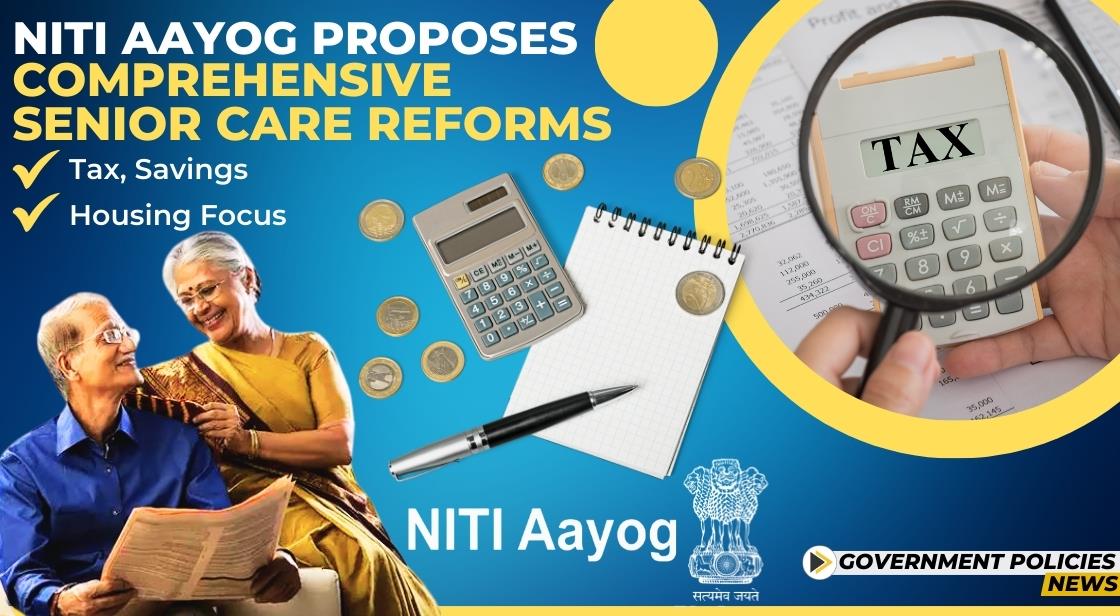NITI Aayog proposes Comprehensive Senior Care Reforms: Tax, Savings, and Housing Focus

News Synopsis
NITI Aayog, the Indian government's policy think tank, has recommended a series of vital reforms to address the evolving needs of the elderly population in India. In a report titled ‘Senior Care Reforms in India – Reimagining the Senior Care Paradigm,’ the focus is on tax reforms, the implementation of a mandatory saving plan, and the creation of a housing plan for the elderly. This comes in light of projections indicating that the senior citizen demographic is expected to comprise 19.5% of India’s population by 2050.
NITI Aayog Recommendations for Senior Care
NITI Aayog's report underscores the need for a holistic approach to senior care reforms in India, advocating for significant changes in taxation policies, mandatory savings mechanisms, and housing solutions tailored for the elderly.
Key Concerns and Recommendations of NITI Aayog:
-
Financial Security: With limited social security, seniors rely on savings often eroded by variable interest rates. NITI Aayog proposes a minimum base rate for senior citizen deposits and tax breaks for older women to bolster financial well-being.
-
Reverse Mortgage: The report advocates reviewing and amending the reverse mortgage scheme to increase liquidity options for seniors.
-
Tax Incentives: Reducing tax and GST burdens on senior care products is seen as crucial to making these services more affordable.
-
National Portal: A dedicated online platform is proposed to streamline access to various senior care services for easier navigation and utilization.
-
CSR Contributions: Encouraging corporate social responsibility (CSR) funds to support care facilities for underprivileged seniors is another key recommendation.
-
Public-Private Partnerships: Collaborations with the private sector through PPP models are suggested to expand access to discounted medical care for seniors.
Urgent Need for Tax Reforms
The report emphasizes the necessity of tax reforms, especially in the context of senior care products. It suggests that revisiting tax structures and implementing Goods and Services Tax (GST) reforms will not only ease the adoption of essential senior care products but also alleviate financial burdens on the elderly population.
Regulatory Mechanism for Savings Plan
Highlighting the dependency of seniors on income generated from savings, the report calls for a regulatory mechanism to establish a viable base rate for the interest accrued on senior citizen deposits. This move aims to prevent the erosion of their income, ensuring financial sustainability for the elderly, especially in a scenario where variable interest rates can sometimes dip below sustenance levels.
Housing Solutions for Elderly Well-being
Recognizing the importance of adequate housing for seniors, the report suggests the development of a national portal for senior care. This portal aims to provide easy access to essential services for senior citizens, catering to their unique housing needs and ensuring a comfortable living environment.
Addressing Gender Disparities
The report highlights the significance of empowering older women financially. Recommending further concessions for older women, it seeks to contribute to their financial well-being, acknowledging the role gender plays in economic disparities among the elderly.
Home-Based Healthcare Market Potential
NITI Aayog's report identifies the growing home-based healthcare market in India as a significant opportunity. With over 75% of elderly individuals suffering from chronic diseases, the report projects the home healthcare market to reach USD 21.3 billion (Rs 1.74 lakh crore) by 2027, offering a more cost-effective alternative to traditional hospital-based care.
Conclusion:
As India grapples with the challenges and opportunities presented by an aging population, NITI Aayog's recommendations aim to pave the way for a comprehensive and sustainable senior care framework. From tax reforms to mandatory savings plans and tailored housing solutions, these measures are crucial steps in ensuring the well-being and financial security of the elderly in the years to come.
You May Like









